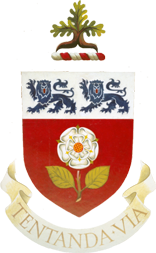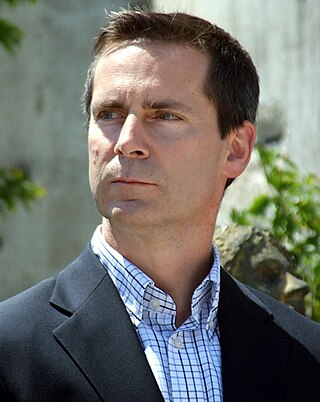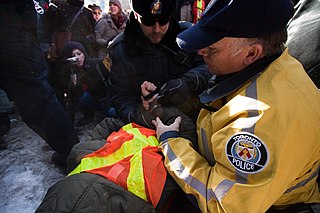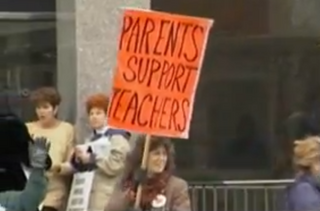Related Research Articles

York University, also known as YorkU or simply YU, is a public research university in Toronto, Ontario, Canada. It is Canada's third-largest university, and it has approximately 55,700 students, 7,000 faculty and staff, and over 325,000 alumni worldwide. It has 11 faculties, including the Faculty of Liberal Arts and Professional Studies, Faculty of Science, Lassonde School of Engineering, Schulich School of Business, Osgoode Hall Law School, Glendon College, Faculty of Education, Faculty of Health, Faculty of Environmental and Urban Change, Faculty of Graduate Studies, School of the Arts, Media, Performance and Design, and 28 research centres.

Dalton James Patrick McGuinty Jr. is a former Canadian politician who served as the 24th premier of Ontario from 2003 to 2013. He was the first Liberal leader to win two majority governments since Mitchell Hepburn nearly 70 years earlier. In 2011, he became the first Liberal premier to secure a third consecutive term since Oliver Mowat after his party was re-elected in that year's provincial election.
The Canadian Union of Public Employees is a Canadian trade union serving the public sector – although it has in recent years organized workplaces in the non-profit and para-public sector as well. CUPE is the largest union in Canada, representing some 700,000 workers in health care, education, municipalities, libraries, universities, social services, public utilities, transportation, emergency services and airlines. Over 60 per cent of CUPE's members are women, and almost a third are part-time workers. CUPE is affiliated with the Canadian Labour Congress and is its greatest financial contributor.

Kathleen O'Day Wynne is a Canadian former politician who served as the 25th premier of Ontario and leader of the Ontario Liberal Party from 2013 to 2018. She was member of provincial parliament (MPP) for Don Valley West from 2003 to 2022. Wynne is the first female premier of Ontario and the first openly gay premier in Canada.

Patrick Cyril "Sid" Ryan is a Canadian labour union leader and politician. Ryan is the former president of the Ontario Federation of Labour.

The Ontario Public Service Employees Union is a trade union representing public sector employees in the province of Ontario, Canada. It claims a membership of approximately 180,000 members. OPSEU was established in 1975 as the successor union to the former Civil Service Association of Ontario, which was founded in 1911. In 1979, OPSEU affiliated with the Canadian Labour Congress, the National Union of Public and General Employees, and the Ontario Federation of Labour. OPSEU is affiliated to several labour councils across Ontario.

The Toronto Catholic District School Board is an English-language public-separate school board for Toronto, Ontario, Canada, headquartered in North York. It is one of the two English boards of education serving the city of Toronto. With 92,000 students, the TCDSB is one of the largest school boards in Canada, and is the largest publicly funded Catholic school board in the world. Until 1998, it was known as the Metropolitan Separate School Board (MSSB) as an anglophone and francophone separate school district.
The Ontario Secondary School Teachers' Federation is a Canadian trade union which represents 60,000 members across Ontario.
The Canadian Union of Public Employees, Local 3902 is a Canadian labour union local representing sessional lecturers, postdoctoral researchers and teaching assistants (TAs) at the University of Toronto, Victoria University in the University of Toronto, the University of St. Michael's College and New College in the University of Toronto.
This is a timeline of labour issues and events in Canada.

The 2008–2009 York University strike was a strike by CUPE Local 3903, the union representing contract professors, teaching assistants, and graduate assistants at York University.

The Elementary Teachers of Toronto (ETT) is a Canadian labour union and the Toronto local of the Elementary Teachers' Federation of Ontario. The organization's members are the full-time public elementary teachers employed by the Toronto District School Board (TDSB).
The Metro Toronto Elementary Teacher's strike was a month-long labour dispute that saw nearly 10,000 elementary teachers with the then Metropolitan Public School Board in Metro Toronto, Ontario, Canada, walk off the job in a bid to achieve more preparation time. The strike ran from September 21 to October 18, 1987.

The Federation of Canadian Secondary Students, French: Fédération des élèves du secondaire au Canada (FCSS-FESC) is a Canadian federally registered charitable organization.

The 2018 York University strike was a strike by CUPE Local 3903, the union representing contract professors, teaching assistants, and graduate assistants at York University. At 143 days long it is the longest strike in the post-secondary sector in Canadian history, surpassing the previous record of the 1976 Laval University 108-day strike. It ended on July 25, when the Ontario Legislature passed the Urgent Priorities Act back-to-work legislation.

Stephen Francis Lecce is a Canadian politician who has served as the Ontario minister of education since June 20, 2019. A member of the Progressive Conservative (PC) Party, Lecce is the member of Provincial Parliament (MPP) for King—Vaughan, representing the riding in the Legislative Assembly of Ontario since his election in 2018. Before running for office, Lecce worked in the Prime Minister's Office (PMO) as the director of media relations during Stephen Harper's tenure.
The 2020 Port of Montreal strike began at 7:00 AM on August 10, 2020, after Local 375 of the Canadian Union of Public Employees walked off the jobsite. The local had previously voted for an indefinite strike. The strike is part of a dispute dating back to 2018, when the union and management were unable to negotiate a new contract.

The Making Ontario Open for Business Act is a law in the province of Ontario that froze the minimum wage in the province and removing a number of protections of workers' rights.

The 1997 Ontario teachers' strike was a labour dispute between the government of Ontario under Premier Mike Harris of the Progressive Conservative Party of Ontario (PCs), and the Ontario Teachers' Federation (OTF) and its member labour unions. The strike occurred in the context of Harris' Common Sense Revolution, a program of deficit reduction characterized by cuts to education and social services. In September 1997, the PCs introduced Bill 160, which sought to reduce education spending and transfer numerous aspects of school administration from local school boards to the provincial government. In response, teachers participated in a province-wide walkout beginning on October 27, 1997.
The 2021 New Brunswick public sector strike was labour strike in the Canadian province of New Brunswick involving employees of the provincial government, represented by the Canadian Union of Public Employees (CUPE). In October 2021, the workers voted to take strike action.
References
- ↑ Benzie, Robert (September 11, 2012). "Ontario teachers vow to curb extracurricular activities as bill passes freezing wages". The Star. Retrieved November 22, 2012.
- 1 2 3 4 5 "Backgrounder". QUEEN'S PRINTER FOR ONTARIO. Retrieved November 21, 2012.
- 1 2 3 4 5 6 7 "Bill 115, Putting Students First Act, 2012". The Legislative Assembly of Ontario. Retrieved December 7, 2012.
- 1 2 3 4 5 "Bill 115, Putting Students First Act, 2012". The Elementary Teachers' Federation of Ontario. Retrieved November 17, 2012.
- ↑ CTVNews.ca Staff (October 15, 2012). "Ontario deficit to be $14.4B this year: Duncan". CTVNews. Retrieved December 7, 2012.
- ↑ Elizabeth II (September 20, 2012), Putitng Students First Act, Queen's Printer for Ontario, S.20 & 22, retrieved January 26, 2013
- 1 2 Elizabeth II (September 22, 2012), "Proclamation" (PDF), The Ontario Gazette, Queen's Printer for Ontario, 145–38, retrieved January 26, 2013
- 1 2 Elizabeth II (January 21, 2013). "Order in Council" (PDF). Human Resources Legislative Update. Retrieved January 26, 2013.
- 1 2 "CUPE Locals launch campaign to defend democratic rights". Archived from the original on December 12, 2012. Retrieved March 23, 2020.
- ↑ ZILIO, Michelle (September 15, 2012). "Hundreds protest Ontario teachers' legislation outside Premier Dalton McGuinty's Ottawa office". Ottawa Citizen. Retrieved November 17, 2012.
- ↑ Flavelle, Dana (September 29, 2012). "Students protest in support of Ontario teachers". The Star. Retrieved November 21, 2012.
- 1 2 3 Brown, Louise (December 13, 2012). "Teacher protest: TDSB and Peel elementary teachers to walk off job Tuesday". Toronto Star. Retrieved December 15, 2012.
- ↑ "Provincial News: CUPE school board workers deliver strong strike mandate". Northumberland View. November 21, 2012. Retrieved November 22, 2012.
- 1 2 Caroline Alphonso; Karen Howlett (December 6, 2012). "Ontario won't nix one-day walkouts as teachers threaten longer strike". The Globe and Mail. Retrieved January 9, 2013.
- 1 2 3 4 5 6 7 8 9 10 Kristin Rushowy; Robert Benzie (January 10, 2013). "Ontario teacher protests: High school and elementary teachers plan one day 'illegal' strikes". Toronto Star. Retrieved January 10, 2013.
- 1 2 3 "Union's deliberate day of chaos is a black mark for teachers". Globe and Mail. January 11, 2013. Retrieved January 11, 2013.
- ↑ Carys Mills; Alyshah Hasham (January 10, 2013). "Teacher protest: GTA schools closed for one-day walkout". Toronto Star. Retrieved January 11, 2013.
- 1 2 Mills, Carys (January 11, 2013). "Teacher protest: All GTA schools will be open after walkout ruled illegal". Toronto Star. Retrieved January 11, 2013.
- 1 2 Chen, Delson (January 12, 2013). "Duncan angered by school closures". Windsor Star. Retrieved January 12, 2013.
- ↑ Kristin Rushowy; Robert Benzie (July 5, 2012). "Ontario Catholic teachers reach deal with province; agree to wage freeze". Toronto Star. Retrieved January 10, 2013.
- ↑ Kretzel, Lasia (August 8, 2012). "Ontario reaches deal with Toronto Catholic School Board on teachers' pay". National Post. Retrieved January 10, 2013.
- 1 2 "Bill 115, Putting Students First Act, 2012". The Legislative Assembly of Ontario. Retrieved January 9, 2013.
- ↑ Robert Benzie; Kristin Rushowy (December 3, 2012). "Ontario teacher protest: Extracurriculars in high schools to go, union says". Toronto Star. Retrieved January 13, 2013.
- ↑ "Ontario teachers union announces more one-day strikes for next week". National Post. Canadian Press. December 8, 2012. Retrieved January 9, 2013.
- ↑ Brennan, Richard J. (December 20, 2012). "CUPE threatens one-day strikes over Bill 115". Toronto Star. Retrieved January 13, 2013.
- ↑ Bradshaw, James (December 30, 2012). "Ontario reaches tentative deal with union representing school support staff". The Globe and Mail. Retrieved January 13, 2013.
- ↑ "Ontario imposes contracts on public school teachers". Canadian Broadcasting Corporation. January 3, 2013. Retrieved January 9, 2013.
- ↑ "Ontario Public Service Employees Union vs. Ontario, Ontario Superior Court, para 134". April 20, 2016. Retrieved November 7, 2022.